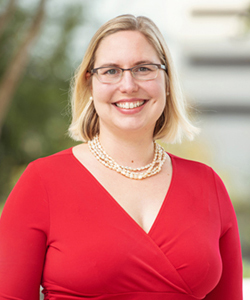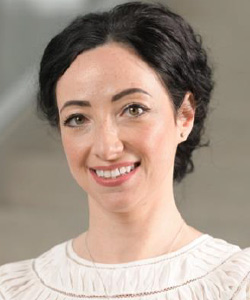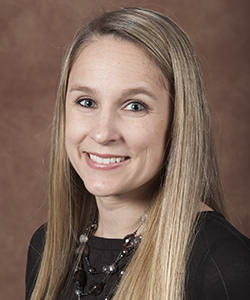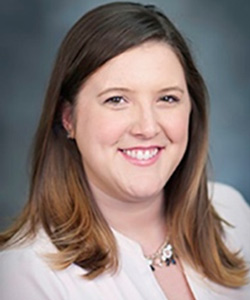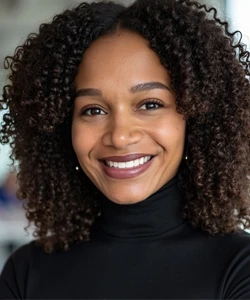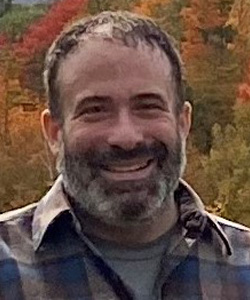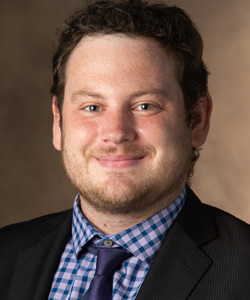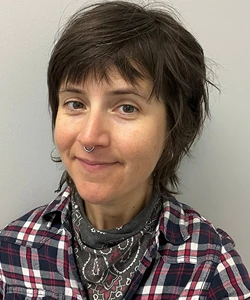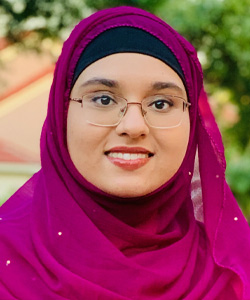Mission
Our mission is to advance substance use disorder (SUD) health services access and quality through rigorous, interdisciplinary health services and health policy research. We seek to inform evidence-based health policy development. We ensure our research is relevant and translatable through community partnerships. We also train the next generation of health services and policy researchers and educate community stakeholders in best practices related to SUD health services and policies. The Substance Use Policy Evaluation and Research (SUPER) team serves as an incubator of pilot research studies and as a partner in major NIH-funded research studies. The Center will also directly seek external funding for financing of its operations. Although the Center is based within the UCF School of Global Health Management and Informatics, it is interdepartmental and interinstitutional.
Vision
We envision a world where all individuals affected by SUD have access to evidence-based, person-centered care. We believe government policies and health services interventions should be informed by rigorous research and designed to facilitate widely accessible, high quality SUD care. We believe interdisciplinary and community collaboration is critical for designing research and disseminating findings that have real-world impact.
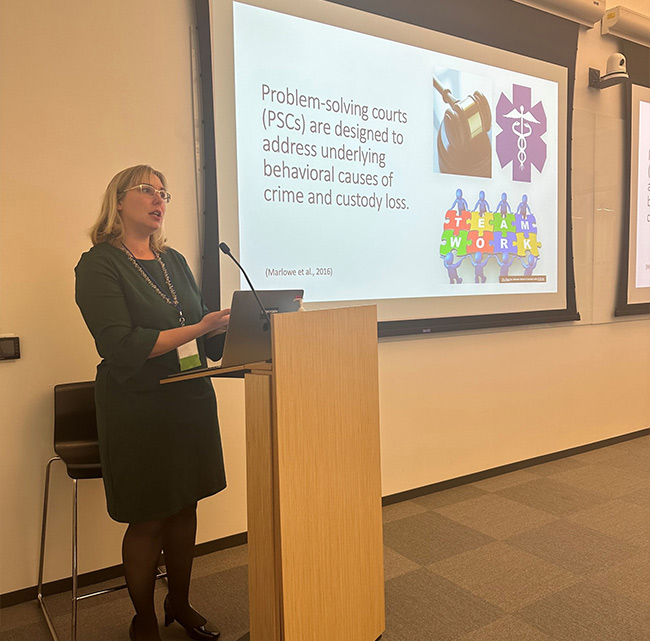
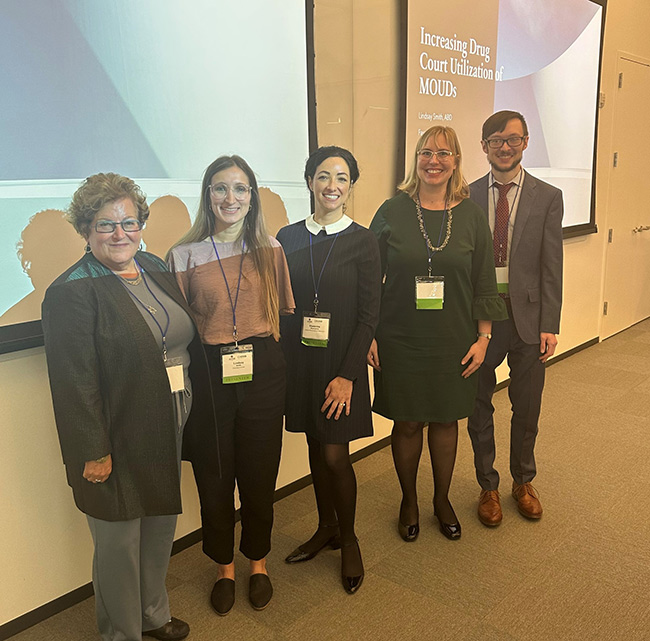
Specific Areas of Expertise
Our directors and core members have expertise in the following areas:
Methods
- Implementation science
- Policy evaluation
- Program evaluation
- Qualitative data collection and analysis
- Survey design and data analysis
- Quantitative analysis of large, complex datasets
- Quasi-experimental research design and analysis
- Causal inference
- Network analysis
Topics
- Policy surveillance
- Policy effects on health service outcomes (e.g., treatment utilization) and health outcomes (e.g., overdose)
- Person-centered care for SUD
- Problem-solving courts (e.g., drug courts)
- Policing
- SUD health policies and health services within criminal-legal institutions (e.g., probation, parole, courts, jails)
- Child welfare and SUD
- Harm reduction
Opportunities for collaboration:
- For researchers
- Would you like to collaborate on an existing or future project? Do you have questions about our work? We would love to hear from you.
- For community members
- Is there a pressing concern that you think needs more research attention? Would you like to collaborate on an existing or future project? We would love to hear from you.
- For learners
- Are you interested in deepening your research skills? Do you have a passion for SUD treatment policies and health services? We would love to hear from you.
Let us know how our group can help you! Email Barbara.andraka@ucf.edu
Resources
Student Mentoring Pod
We have bi-monthly mentoring meetings with undergraduate and graduate students interested in substance use related research. Contact Barbara.Andraka@ucf.eduif you are interested in joining these meetings.
Our Experts
The SUPER team includes interdisciplinary faculty with expertise in substance use disorder health services and policy, mental health services, qualitative methods, quantitative methods, and mixed methods. Our goal is to help organizations (e.g., government agencies, judges, court staff, and clients) use evidence-based practices for substance use disorder treatment, including for opioid use disorder.
Contact the Substance Use Policy Evaluation and Research Workgroup at barbara.andraka@ucf.edu.
Research Affiliate Members
- Brad Ray, Ph.D. (RTI International), Senior Justice and Behavioral Health Researcher
- Omar Martinez, JD, MPH (UCF Population Health), Associate Professor
- Shana Harris, Ph.D. (UCF Department of Anthropology), Associate Professor
- Thuy Nguyen, Ph.D. (University of Michigan Department of Health Management and Policy), Assistant Professor
- Noa Krawczyk, Ph.D. (NYU Department of Population Health), Assistant Professor
- Michael Caudy, Ph.D. (UCF Department of Criminal Justice), Associate Professor
Community Advisory Board Members
- David Frank, PhD (CDUHR) – Methadone treatment expert and person with lived experience
- Kristen Lewandowski, PhD (ASPIRE) – Licensed mental health therapist and administrator of an SUD treatment network
- Margaret Seiger, PhD (University of Kansas) – Child welfare policy specialist
- Camila Arnaudo, MD (Indiana University) – SUD treatment provider, focused on pregnant populations
- Malik Burnett, MD (American Society of Addiction Medicine) – SUD treatment provider
- Nichole Medina Rodriguez (Rebel Recovery Jacksonville) – Leader of a harm reduction program
Our Work
Our work has been supported by several sources:
- National Institutes of Health - National Institute on Drug Abuse
- National Institutes of Health - Justice Community Overdose Innovation Network (JCOIN) Rapid Innovation Grants (J-RIG)
- Florida Office of the State Courts Administrator (OSCA)
- Bureau of Justice Administration (BJA)
- University of Massachusetts
Current Projects
Evaluating state policies to facilitate emergency department-based treatment initiation for opioid use disorder
- Goal: Identify, assess the content of, and examine effects of state statutes/regulations mandating provision of medications for opioid use disorder in hospital emergency departments
- Funding: NIH National Institute on Drug Abuse, R01DA060240 (Principal Investigators: Andraka-Christou at University of Central Florida – SUPER Executive Director; Nguyen at University of Michigan); $3,534,232
- Collaborator: University of Michigan
Improving Access to MOUD in Drug Courts through Inter-agency Collaboration: COLAAB Study
- Goal: Using a stepped wedge randomized controlled trial, evaluate the implementation of an intervention for improving collaboration between drug courts and substance use disorder treatment providers
- Funding: NIH National Institute on Drug Abuse, 1R01DA064508-01 (Principal Investigators: Pivovarova at University of Massachusetts; Andraka-Christou at University of Central Florida); $3,515,699
- Collaborators: University of Massachusetts Chan School of Medicine, Florida Supreme Court Office of the State Courts Administrator, and the Massachusetts Office of the State Courts Administrator
Treatment retention in family treatment courts
- Goal: To examine retention in SUD among people who have completed family treatment court, including barriers and facilitators
- Funding: JCOIN J-RIG (PI: Andraka-Christou – SUPER Executive Director); $123,632
- Collaborator: Florida Supreme Court Office of the State Courts Administrator
Public Medications for Opioid Use Disorder Attitudes
- Goals: To test the effects of different factors (e.g., social norms, beliefs, self-efficacy) on MOUD referral decisions among family members, and to identify sources of knowledge about MOUD
Florida Dependency Drug Court Longitudinal Evaluation
- Goal: To identify trends in treatment, program completion, and participant characteristics among people enrolled in family treatment courts in Florida
- Collaborator: Florida Supreme Court Office of the State Courts Administrator
Use of Medico-Legal Partnerships in Addiction Treatment Settings
- Goal: To explore the feasibility, appropriateness, and acceptability of providing legal services to patients in opioid treatment programs using a collaborative model with non-profit legal aid organizations
- Collaborators: Population Health Department at UCF, the University of Massachusetts Chan School of Medicine, and ASPIRE Health Partners (SUD treatment facilities in Florida)
Accessibility of information about opioid treatment programs
- Goal: To examine the ease of obtaining data about methadone treatment hours and contact information in Florida
Key informant perspectives on redesign of the SUD system
- Goal: To understand the features of an “ideal” SUD treatment system from the perspective of key informants, including their perspectives on redesigning the methadone treatment system
Scoping review of court-related MOUD policies and practices
- Goal: To identify the gaps in the literature regarding court-related MOUD policies and practices
Scoping review of outcomes of involuntary civil commitment for SUD
- Goal: To identify gaps in the literature regarding outcomes of involuntary civil commitment for SUD
Completed Projects
Family Dependency Drug Court Evaluation
Goal: To evaluate the implementation of best practices in family treatment courts; and to describe court practices in the context of the COVID-19 pandemic
Resulting paper:
Golan, OK, Ahmed FZ, Andraka-Christou B, Totaram R, Asi Y, Atkins D. Impact of COVID-19 on Florida family dependency drug courts. Health Justice. 2024;12: 4. DOI
Resulting conference presentations:
Andraka-Christou B, Golan O, Totaram R, Ahmed F, Asi Y, Atkins D. Implementation of evidence-based practices in five Florida family dependency drug courts: Lessons learned from court team member perspectives. Poster presentation at 16th Annual Dissemination and Implementation Conference of Academy Health. December 11, 2023; Arlington, VA.
Andraka-Christou B, Asi Y, Totaram R, Ahmed F, Atkins D. Implementation of peer support specialists in Florida family dependency drug courts. Oral presentation at annual meeting of the 16th Academic Health and Policy Conference on Correctional Health; April 13, 2023; Raleigh, NC.
Totaram R, Ahmed F, Andraka-Christou B, Atkins D, Asi Y. Family dependency drug court service modifications during COVID-19. Poster presentation at: American Society of Addiction Medicine annual conference; April 1, 2022; Hollywood, FL
Evaluation of the Florida Opioid Initiative
Goal: To identify court policies, practices, and attitudes related to medications for opioid use disorder (MOUD) in problem-solving courts (e.g., drug courts)
Resulting papers:
Ahmed F, Andraka-Christou B, Clark MH, Totaram R, Atkins DN, del Pozo. Barriers to medications for opioid use disorder in the court system: provider availability, provider “trustworthiness,” and cost. Health Justice. 2022;10(24). DOI
Andraka-Christou B, Clark MH, Atkins DN, del Pozo B. Criminal problem-solving and civil dependency court policies regarding medications for opioid use disorder. Subst Abuse. 2021;43(1):425-432. DOI
Andraka-Christou B, Atkins D. Whose opinion matters about medications for opioid use disorder? A Cross-sectional survey of social norms among court staff. Subst Abus. 2021;42(4):735-750. DOI
Andraka-Christou B, Atkins D. Beliefs about Medications for Opioid Use Disorder among Florida Criminal Problem-Solving Court & Dependency Court Staff. Am J Drug Alcohol Abuse. 2020;46(6):749-760. DOI
Andraka-Christou B, Atkins D, Madeira J, Silverman R. Receipt of Training about Medication for Opioid Use Disorder from Pharmaceutical Manufacturers: A Preliminary Study of Florida Criminal Problem-Solving and Dependency Court Staff. Drug Alcohol Rev. 2020;39(5):583-587. DOI
Resulting conference presentations:
Andraka-Christou B, Ahmed F, Totaram R, Clark MH, Atkins D, Del Pozo B. Court staff perceptions of “trustworthy” providers of medications for opioid use disorder annual conference. Oral presentation at annual Academic Consortium on Criminal Justice Health. April 6, 2022 (virtual).
Andraka-Christou B, Atkins D, Clarke MH. Problematic policies regarding medications for opioid use disorder among Florida courts. Poster presented at: American Society of Addiction Medicine Annual Conference. April 22-24, 2021. (Virtual).
Andraka-Christou B, Clarke MH, Atkins D. Training impacts some court staff beliefs about medications for opioid use disorder. Poster presented at: American Society of Addiction Medicine Annual Conference; April 22-24, 2021. (Virtual).
Andraka-Christou B, Atkins D, Ahmed F S. Florida court staff beliefs and social norms regarding medications for opioid use disorder. Poster presented at: American Public Health Association Annual Meeting; October 2020; San Francisco, CA. (Virtual).
Evaluation of Virtual Problem-Solving Court Services
Goal: To explore experiences of problem-solving court staff and clients with virtual court services during COVID-19
Resulting papers:
Andraka-Christou B, Atkins DD, Clark MH, Del Pozo B, Ray B. A National Survey of Problem-Solving Court Staff Perceptions of In-Person versus Virtual Hearings. J Am Acad Psychiatry Law. 2024;52(1):15-22. DOI
O’Neil MM, Andraka-Christou B, Kunkel T, Bryant K, Huynh P, Ray B. Treatment Court Staffs’ Perceptions in Support of the Use of Virtual Services in Court Post-Pandemic. Criminal Justice and Behavior. 2024; 51(2): 286-306. DOI
Ray B, Kunkel T, Bryant K, Hedden B, Andraka-Christou B, O’Neil M, Huynh P. Client attitudes toward virtual treatment court. J Subst Abuse Treat. 2022;140:108833. DOI
Designing Interactive Education about Medication for Opioid Use Disorder for Judges and Court Staff
Goal: To inform development of educational videos for court staff about MOUD
Resulting paper:
Andraka-Christou B, Asi YM, Totaram Rs, Matusow H. Problem-Solving Court Staff Preferences for Educational Videos about Medications for Opioid Use Disorder. Subst Use Misuse. 2023. DOI
Resulting conference presentation:
Andraka-Christou B, Yara A, Totaram R. Court staff content and style preferences for educational videos about medication-assisted treatment. Poster presented at: American Public Health Association Annual Meeting; October 2020; San Francisco, CA. (Virtual).
Police Chiefs Attitudes Toward SUD Services
Goal: To test effects of different communication framing approaching on policy chief support of different SUD policies, to identify police attitudes toward different SUD services, and to explore changes related to policing since the murder of George Floyd
Resulting papers:
Bailey A, Andraka-Christou B, Rouhani S, Clark MH, Atkins D, del Pozo B. Beliefs of US chiefs of police about substance use disorder, fentanyl exposure, overdose response, and use of discretion: Results from a national survey. 2025; 13(1): 13. DOI
del Pozo B, Rouhani S, Bailey A, Clark MH, Martins K, Ahmed F, Atkins D, Andraka-Christou B. The effects of message framing on US police chiefs’ support for interventions for opioid use disorder: A randomized survey experiment. Health & Justice. 2025; 12: 50. DOI
del Pozo B, Rouhani S, Clark MH, Atkins D, Andraka-Christou B, Martins K. Understaffed and beleaguered: A national survey of US chiefs of police about the post-George Floyd era. Policing: An International Journal of Policy & Practice. 2024;47(5): 846-860. DOI
Buprenorphine-Involved Overdose Trends
Goal: To identify extent of buprenorphine involvement in opioid overdoses, and to examine the relationship between overdose victim characteristics and provision of naloxone-involved 9-1-1 calls
Resulting papers:
Atkins DN, del Pozo B, Clark MH, Andraka-Christou B, O’Donnell D, Ray B. Disparities in the accuracy of reporting opioid overdoses to 9-1-1 by race and sex of overdose victim, Marion County, Indiana, 2011–2020. Health Justice. 2024;12: 25. DOI
del Pozo B, Atkins D, Andraka-Christou B, Wightman R, Clark MH, Huynh P, Ray B. Buprenorphine involvement in opioid overdose deaths: A retrospective analysis of postmortem toxicology in Marion County, Indiana, 2015-2021. Drug & Alcohol Dependence Reports. 2022;6; 100131 DOI
Pilot Intervention to Improve Collaboration Between Drug Courts and MOUD Providers
Goal: To pilot test the implementation and effects of an intervention to improve collaboration between drug courts and MOUD providers
Resulting papers:
Pivovarova E, Taxman FS, Boland AK, Andraka-Christou B, de la Cruz BA, Semlson D, Lemon SC, Friedmann PD. Medication for Opioid Use Disorders (MOUD) Providers’ Experiences with Recovery Courts. Substance Use & Addiction Journal. 2024;0:0. DOI
MOUD Decision-Making in Problem-Solving Courts
Goal: To identify and experimentally test the factors involved in decisions about MOUD in problem-solving courts, including partnerships with MOUD providers
Resulting papers:
Andraka-Christou B, Viglione J, Ahmed F, del Pozo B, Atkins DN, Clark MH, Pivovarova E. Factors affecting problem-solving court team decisions about medications for opioid use disorder. Journal of Substance Use and Addiction Treatment (previously called The Journal of Substance Abuse Treatment). 2025;168:209525. DOI
Resulting conference presentations:
Andraka-Christou B, Viglione J, Totaram R, Ahmed F, Clark M, Atkins D, del Pozo B. Drug courts & MOUD providers: a complicated relationship. Oral presentation at Indiana University School of Medicine. Department of Psychiatry. Addiction Psychiatry Symposium; April 10, 2023; Indianapolis, IN (virtual).
Andraka-Christou B, Viglione J, Ahmed F, Clark MH, del Pozo B, Pivovarova E, Atkins D, Totaram Rs. Mixed method study of collaborations between problem-solving court staff and community providers of medications for opioid use disorder. Oral presentation at NIH Justice Community Opioid Innovation Network Steering Committee Annual Meeting. June 12, 2024; Baltimore, MA.
Andraka-Christou B, Viglione J, Totaram Rs, Ahmed F, Clark MH, del Pozo B, Atkins DN. Factors involved in problem-solving court decisions to allow medications for opioid use disorder. Oral presentation at the annual conference of Addiction Health Services Research; October 19, 2023; New York City.
Andraka-Christou B, Viglione J, Clark MH, Totaram R, Ahmed F, del Pozo B, Atkins D. Identifying MOUD Decision-Making Factors in Criminal Problem-Solving Courts. Oral presentation at annual meeting of the Association for Public Policy Analysis & Management; November 17, 2022; Washington. D.C.
Court Medical Marijuana Policies
Goal: To explore types of policies and frequencies of different policies related to medical marijuana utilization in family treatment courts
Resulting conference presentations:
Andraka-Christou B, Polischuk L, Totaram Rs, Clark MH, Atkins D, Pivovarova E, del Pozo B. Medical marijuana policies and practices in Florida family treatment courts. Oral presentation at Rise24: The National Annual Conference of All Rise (the National Association of Drug Court Professionals). May 23, 2024; Anaheim, CA.
Manuscript currently under review:
Polischuk L, Andraka-Christou, B, Akil, S, Totaram R, Atkins DN, Clark MH, Pivovarova E, del Pozo B. Medical Marijuana Policies in Family Treatment Courts: A mixed-methods study of court policies, practices and decision-making factors. 2025.
SUPER Symposium
The first annual symposium hosted by the Substance Use Policy Evaluation and Research (SUPER) team will be held in-person on February 8, 2024 on the Downtown UCF campus (Orlando, Florida). This conference will focus on substance use disorder and mental health disorder policy and health services. The symposium will take an interdisciplinary approach, with research presentations and workshops related to the justice system, counseling, public affairs, anthropology, and other contexts.
We invite researchers, undergraduate and graduate students, health care professionals, and members of the community to attend.
This all-day symposium will include a keynote speaker, three research-focused workshops, oral presentations, lunch, a poster presentation, and a reception.
Please email SUPER with any questions at barbara.andraka@ucf.edu.
Follow us on Twitter for Symposium updates.
Interested in attending the symposium? Registration is free but required.
Registration deadline is January 26th, 2024.
Register HereAre you an undergraduate/graduate student interested in presenting a poster?
Submissions are open for graduate and undergraduate students from any university interested in sharing their research via a poster at our evening reception.
An abstract submission of approximately 300 words is required with the following components:
- Abstract Title
- Background Information
- Methods
- Results
- Conclusion
The EXTENDED poster abstract submission deadline is January 19, 2024.
The SUPER Symposium will be held across two locations: DPAC 169 East Wing and the Marriot Hotel Downtown (Winward Room). See campus map.
Event Parking Information
Visitors to UCF Downtown may purchase a $5 daily parking permit using UCF’s virtual permits. The first level of the Parramore Garage offers daily virtual permit parking only. Overflow parking for daily virtual permits is available on the 4th floor of the Parramore Garage or on any level of the Amelia Garage. Daily permits will be valid in all of the “D” (green) parking spaces in the Parramore Garage or UCF Amelia Garage. After 5:30 pm, daily permits are valid in red or blue spaces.
Metered parking along Livingston Street and by Union West, as well as an hourly parking lot on Livingston Street adjacent to the Marriott Hotel, is managed by the City of Orlando. Meters for on-street parking spaces must be paid using the ParkMobile app and is typically $2 per hour. Currently, the city is offering free parking for up to 2 hours per day with discount code “ParkDTO”. See all parking options.

